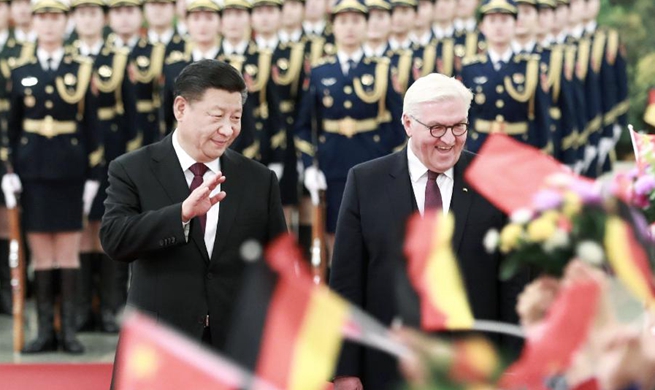by Eric J. Lyman
ROME, Dec. 10 (Xinhua) -- The Italian government and the European Commission continue their on-again off-again negotiations over Italy's 2019 draft budget, and the standoff, ultimately due to the country's slow economic growth, has had a direct impact on the country's rating by the European Central Bank.
The government of Prime Minister Giuseppe Conte and the executive branch of the European Union have been entrenched in their positions over the draft budget for weeks. The Commission's guidance called for the country's 2019 budget to include a deficit equivalent to no more than 0.8 percent of its gross domestic product, while the actual plan the Conte government first submitted on Oct. 22 foresaw three times more than that.
Since then, there have been various reports of potential agreements, but the two sides remain at odds.
The situation is likely to change soon. The European Commission was scheduled to complete its last formal evaluation on Dec. 9, while Italian law requires the budget be finalized no later than Dec. 23.
"The central factor is economic growth," Carlo Altomonte, an economist with Milan's Bocconi University, told Xinhua. "If the economy grew more, these problems about deficits would become much less significant."
The Conte government says the high deficit will help spark economic growth. But so far the budget plan has had the opposite effect: economic and political uncertainty has helped push government bond yields higher all year.
Higher yields, which reflect investor jitters, increase the government's costs for borrowing money and act as a drag on growth by pushing interest rates higher.
Now the slow growth is having a secondary impact. The European Central Bank, which controls monetary policy for the 19-nation euro currency zone, has readjusted the "weight" Italy has with the bank, citing the country's decreased percentage relative to the other eurozone economies. Italy's economy represented 12.3 percent of the total previously, but the figure has now been reduced to 11.8 percent.
According to Altomonte, this means that the bank will reduce the amount of the money it spends on buying Italian government bonds. Though Altomonte said the reduction will be marginal -- "tens of millions of euros," he said, "not hundreds of millions" -- it will be another factor pushing yields higher by reducing demand.
Cesare Imbriani, a political economist with Rome's La Sapienza University, said the central obstacle between Italy and the European Commission is much more political than economic.
"Neither side wants to back down for political reasons," Imbriani said in an interview. "They cannot be seen as backing down. Both sides have to play a hard line."
"In Italy, there is a lack of political will to make hard choices that will have a real impact on growth," he said, adding "The priorities are political."
If the standoff continues until the end of the month, the sides will enter into unchartered territory.
If Italy fails to gain the approval of EU commissioners, it could face massive fines starting in 2019, potentially as much as 0.2 percent of its gross domestic product, or around 4.4 billion euros (5 billion U.S. dollars).
And if the country fails to finalize its budget by Dec. 23, it will result in a series of temporary one-month budget aimed at keeping the government running and further hindering economic growth.













